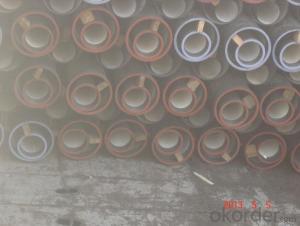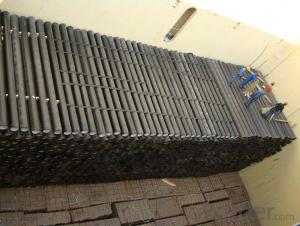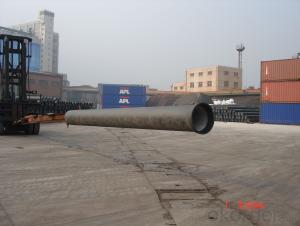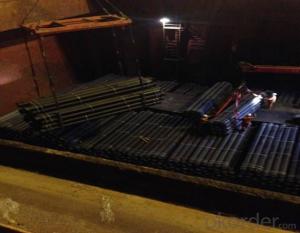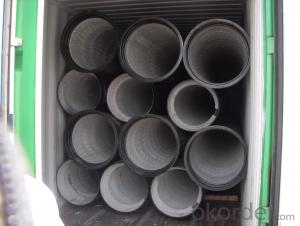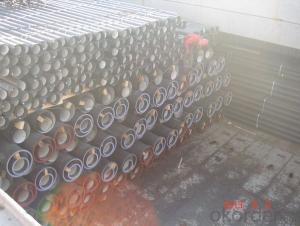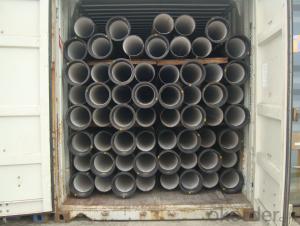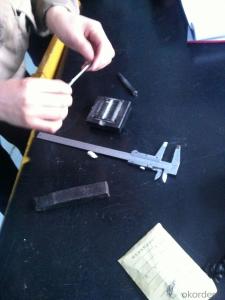DUCTILE IRON PIPES AND PIPE FITTINGS K8CLASS DN200
- Loading Port:
- Tianjin
- Payment Terms:
- TT OR LC
- Min Order Qty:
- 22 pc
- Supply Capability:
- 3000 pc/month
OKorder Service Pledge
OKorder Financial Service
You Might Also Like
Material : Ductile Cast Iron
Size Range : DN 80mm to DN 2000mm
Unit Effective Length : 6m or 5.7m
Manufacture Standard: ISO 2531:1998/ EN 545:2006/EN 598:2007
Annual capacity : 200,000 tons
Coating Exterior: Zinc 130g/m2 according to ISO 8179-1 and bitumen coating 70 microns.
Cement Interior: Portland Cement/ High Alumina Cement/ Sulphate Resisting Cement Lining according to ISO 4179
Special requirements on external coating and internal lining can be applied
We also provide accessories such as SBR/EPDM rubber gaskets, lubricant paste, pipe caps, PE sleeves, etc.
Additional Parts:
Each pipe is strictly inspected according to related standard to ensure permanently high performance.
Easy Installation at site and service free for life
Long Service Lifespan
Quotation will arrive you within 24hours once we get your inquiry.
We guarantee offering you a competitive price.
A copy of original inspection reports of pipes will be offered after shipment.
Photos of loading process will be sent to the customer after shipment effect.
We will follow-up the delivery progress after shipment effect and update to the customer on weekly basis.
- Q: What is the average cost of ductile iron pipes?
- The cost of ductile iron pipes can differ based on factors like diameter, length, and location, resulting in varying averages. Typically, the price range for ductile iron pipes is $30 to $100 per linear foot. To illustrate, a 6-inch diameter ductile iron pipe that is 20 feet long could cost approximately $600 to $2,000. It is crucial to understand that these figures are approximations and subject to alteration due to market conditions, project specifications, and supplier pricing. Thus, it is advisable to consult local suppliers or contractors for precise pricing details regarding specific projects.
- Q: How are ductile iron pipes protected against external corrosion?
- Ductile iron pipes are protected against external corrosion through the application of protective coatings such as polyethylene, epoxy, or zinc. These coatings act as a barrier between the pipe and the surrounding environment, preventing contact with corrosive elements such as water, soil, or chemicals. Additionally, cathodic protection techniques, such as sacrificial anodes or impressed current systems, may also be employed to further enhance the corrosion resistance of ductile iron pipes.
- Q: How are ductile iron pipes protected against internal scaling or buildup?
- Ductile iron pipes are protected against internal scaling or buildup through the use of various coatings and linings. One commonly used method is cement mortar lining, where a layer of cement mortar is applied to the inner surface of the pipe to prevent scaling and corrosion. Additionally, epoxy coatings are also utilized, which provide a smooth and protective layer that inhibits the formation of scale and buildup. These protective measures help to ensure the longevity and efficiency of ductile iron pipes in various applications.
- Q: What is the expected fire resistance of ductile iron pipes?
- The expected fire resistance of ductile iron pipes is high due to their ability to withstand high temperatures without losing structural integrity. They have a melting point of approximately 1200°C, making them suitable for applications where fire protection is crucial.
- Q: What is the lifespan of ductile iron pipe?
- The lifespan of ductile iron pipe can vary depending on several factors such as the quality of the pipe, installation conditions, and maintenance practices. On average, ductile iron pipe can last for 50 to 100 years or more, making it a durable and long-lasting option for water and wastewater infrastructure.
- Q: How are ductile iron pipes repaired if they get damaged?
- Ductile iron pipes are repaired in a few different ways depending on the extent of the damage. Here are some common methods for repairing ductile iron pipes: 1. Spot Repair: If the damage is minimal and localized, a spot repair can be carried out. This involves cutting out the damaged section of the pipe and replacing it with a new section. The new section is typically joined to the existing pipe using mechanical couplings or flanged connections. 2. Pipe Lining: In cases where the damage is more extensive but the pipe is still structurally sound, pipe lining can be used. This involves inserting a liner into the damaged pipe, which creates a new smooth surface. The liner can be made of various materials such as epoxy or cured-in-place pipe (CIPP). This method avoids the need for excavation and replacement of the entire pipe. 3. Pipe Bursting: For severely damaged or deteriorated pipes, pipe bursting may be the best option. This process involves pulling a new pipe through the existing damaged pipe, simultaneously fracturing the old pipe and replacing it with a new one. This method is typically used when the existing pipe is beyond repair and needs complete replacement. 4. Welding and Patching: In certain cases, small leaks or cracks in ductile iron pipes can be repaired by welding or patching. Welding involves melting and fusing the metal together to seal the damaged area. Patching, on the other hand, involves applying a specialized epoxy or composite material over the damaged section to create a watertight seal. It is important to note that the repair method used will depend on factors such as the extent of the damage, accessibility to the pipe, and the expertise of the repair crew. In all cases, proper assessment, planning, and execution are crucial to ensure a successful and long-lasting repair.
- Q: Can ductile iron pipes be used for drainage systems in airports?
- Yes, ductile iron pipes can be used for drainage systems in airports. Ductile iron pipes are known for their strength, durability, and resistance to corrosion, making them suitable for various applications, including drainage systems. They can effectively handle the high flow rates and heavy loads typically associated with airports, ensuring efficient drainage and preventing water accumulation on runways, taxiways, and other areas.
- Q: Are ductile iron pipes suitable for use in hydropower projects?
- Yes, ductile iron pipes are suitable for use in hydropower projects. Ductile iron pipes have a high tensile strength and are resistant to corrosion, making them ideal for applications in hydropower projects where water flow and pressure are involved. They are capable of withstanding high pressure and are durable, ensuring long-term reliability and safety in hydropower systems. Additionally, ductile iron pipes are cost-effective compared to other materials like steel, making them a popular choice for hydropower projects. Overall, ductile iron pipes offer the necessary characteristics and performance qualities required for the demanding conditions of hydropower projects.
- Q: Can ductile iron pipes be used in tunneling or microtunneling projects?
- Yes, ductile iron pipes can be used in tunneling or microtunneling projects. Ductile iron pipes are known for their strength, durability, and flexibility, making them suitable for underground applications. They can withstand the external pressure exerted by the surrounding soil or rock during tunneling, ensuring the integrity and safety of the project. Additionally, ductile iron pipes have excellent corrosion resistance properties, which is crucial in tunneling projects where the pipes are exposed to moisture and other corrosive elements. Their smooth internal surface also facilitates the flow of fluids or materials through the pipes, making them an ideal choice for tunneling or microtunneling projects.
- Q: What is the expected leakage rate of ductile iron pipes?
- The leakage rate of ductile iron pipes can vary depending on several factors, including pipe age, condition, installation quality, and external influences on pipe integrity. However, in comparison to other pipe types, ductile iron pipes are renowned for their durability and low leakage rates. Based on industry standards and studies, well-maintained and correctly installed ductile iron pipes typically have an expected leakage rate of less than 0.5 liters per pipe per day (LPPD). This leakage rate meets the requirements set by regulatory bodies and organizations, and is considered acceptable. It is crucial to emphasize that regular maintenance and inspections are vital in sustaining the low leakage rate of ductile iron pipes. Prompt identification and repair of potential leaks or damages can effectively minimize the overall leakage rate. Moreover, advancements in manufacturing techniques and pipe design have led to the creation of more leak-resistant ductile iron pipes. These pipes may have even lower expected leakage rates than the industry average, further improving their performance and reliability. Ultimately, when properly installed and maintained, ductile iron pipes are a reliable choice for various water distribution and transmission systems, as their expected leakage rate is generally low.
Send your message to us
DUCTILE IRON PIPES AND PIPE FITTINGS K8CLASS DN200
- Loading Port:
- Tianjin
- Payment Terms:
- TT OR LC
- Min Order Qty:
- 22 pc
- Supply Capability:
- 3000 pc/month
OKorder Service Pledge
OKorder Financial Service
Similar products
Hot products
Hot Searches
Related keywords
